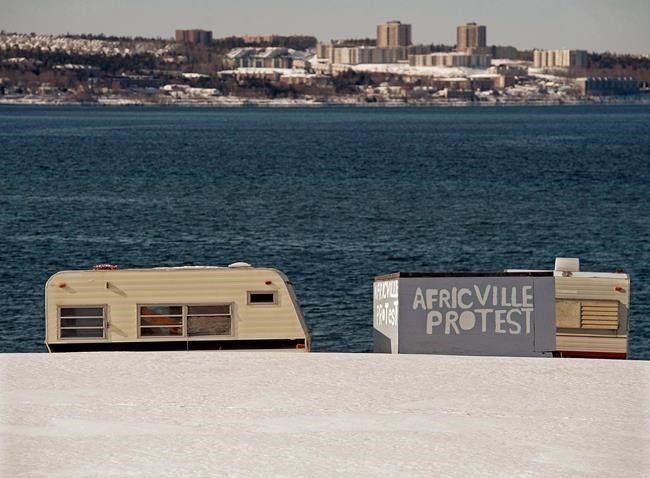
Eddie Carvery's trailers rest on the shore of Bedford Basin, the site of the former community of Africville in Halifax on Tuesday, Feb. 24, 2015. On the shores of the Bedford Basin - where a thriving black community once stood before it was bulldozed by the City of Halifax - lives a man who still refuses to leave Africville. THE CANADIAN PRESS/Andrew Vaughan
November 30, 2016 - 1:06 PM
HALIFAX - A look at the history of Africville in Halifax:
1848: The first black settlers buy land in Africville, establishing the community as a home for African-Nova Scotians.
1849: Residents build Africville's first church. Seaview United Baptist Church serves as the community's spiritual and cultural centre.
1850s-1950s: A city prison, an infectious disease hospital, a slaughterhouse and a city dump are built and operate in the surrounding area.
1948: Halifax approves funds to connect Africville to water and sewer services, but these are never installed. This, along with years of neglect, eventually leads the city to formally label the community a slum.
1964-70: Halifax evicts the residents of Africville in the name of urban renewal, relocating some of them using city dump trucks. Aaron (Pa) Carvery sells his property for about $14,000 on Dec. 30, 1969, making him the last person to leave. Africville is demolished and Seaview Park is built in its place.
1983: The Africville Genealogy Society is formed and soon afterwards begins looking for redress from the city for the destruction of Africville.
March 28, 1996: Former residents of Africville file a statement of claim alleging the City of Halifax did not provide landowners with adequate compensation for their land.
June 5, 1996: Heritage Canada designates Africville a national historic site, recognizing it as a symbol of the country's struggle against racism.
Feb. 24, 2010: Halifax offers a settlement and apology to the residents and descendants of Africville. The settlement includes a hectare of land on the former community site to rebuild the community church and $3 million towards the building's reconstruction.
July 2012: The Africville Museum, a replica of the Seaview United Baptist Church, opens to the public.
Dec. 15, 2014: A lawyer for former Africville residents files a notice of motion to amend the 1996 statement of claim to include new evidence of expropriation. The amendments were later approved.
2014: An Africville stamp is launched by Canada Post.
Nov. 30, 2016: Hearing in Nova Scotia Supreme Court on potential certification of class action brought by Nelson Carvery.
News from © The Canadian Press, 2016